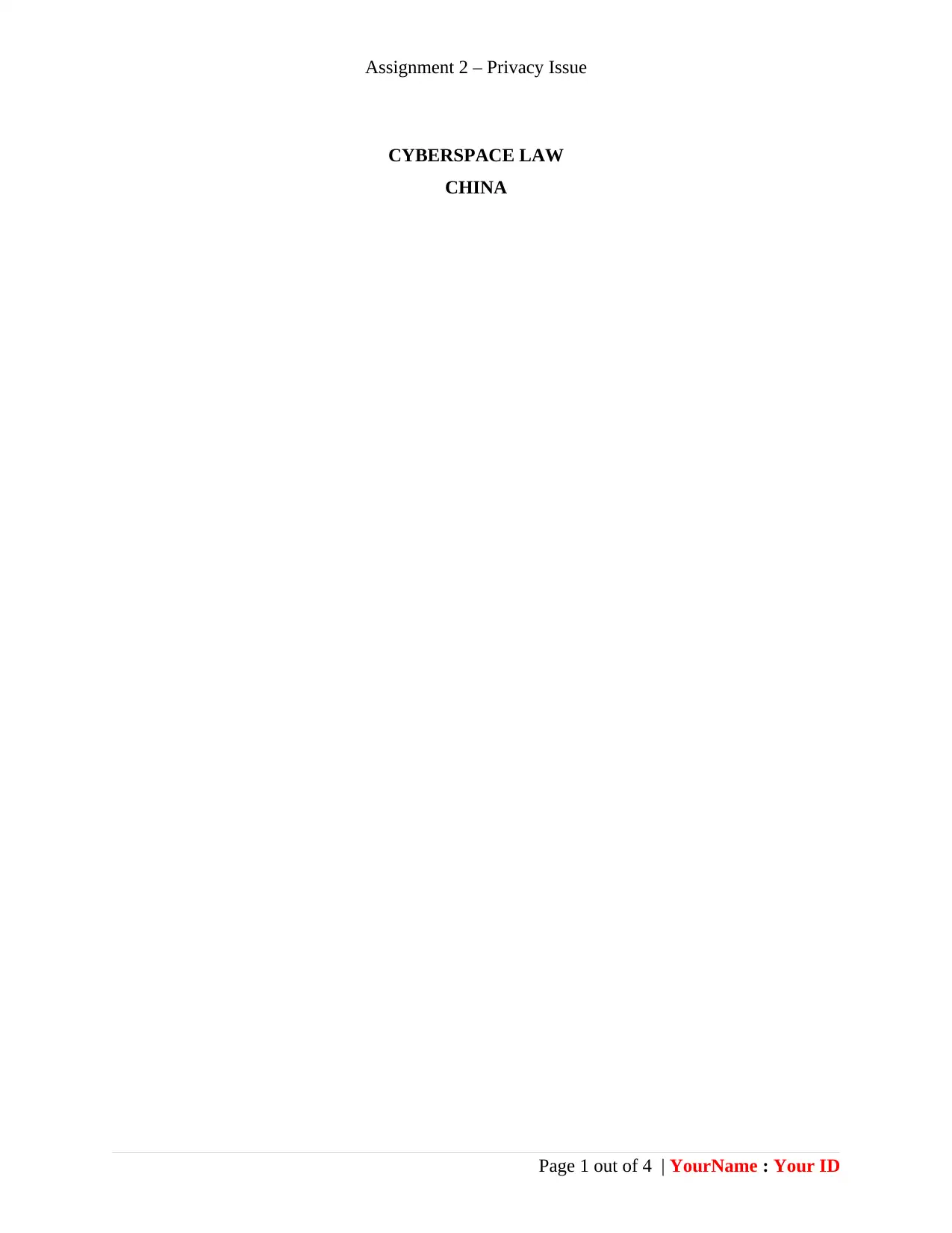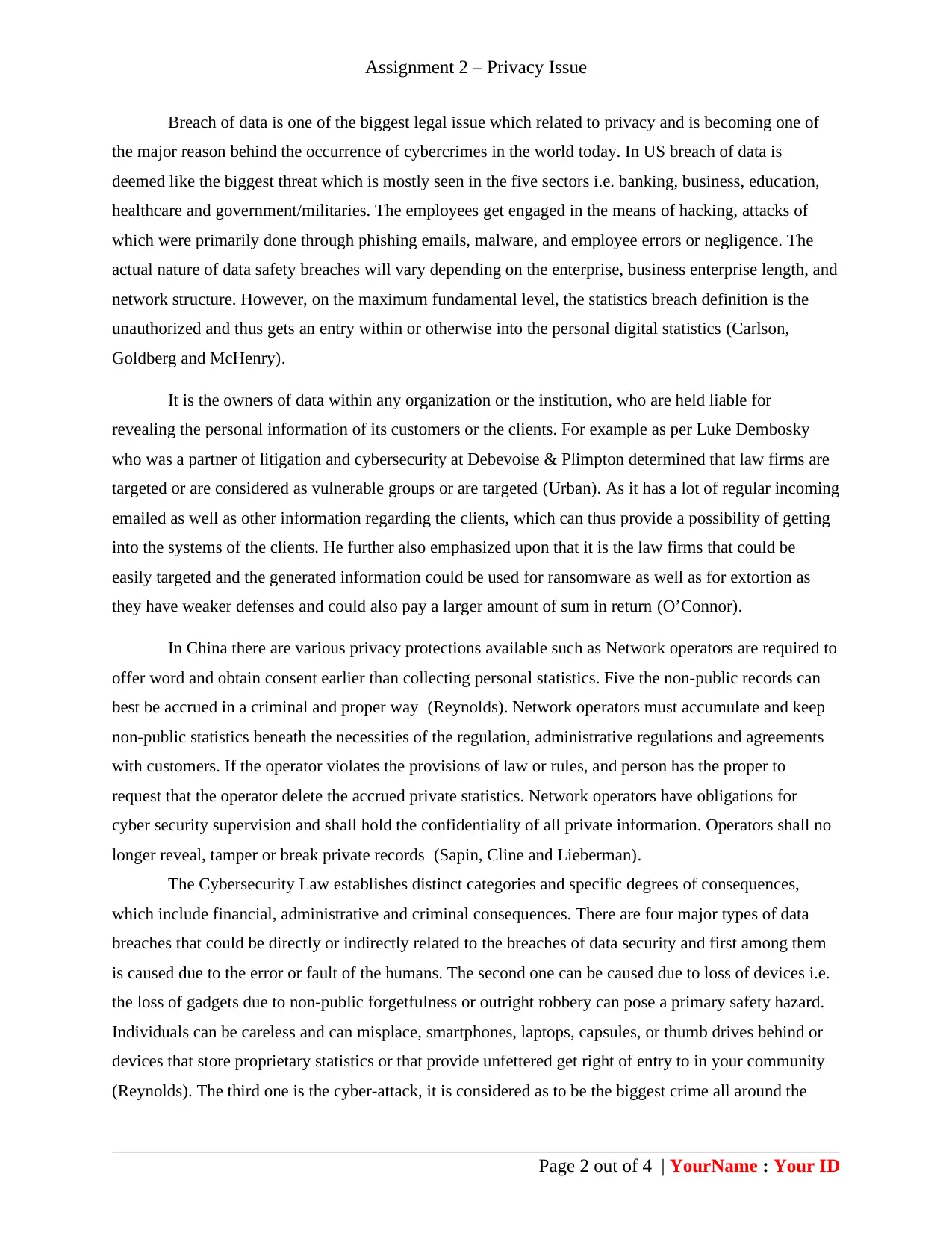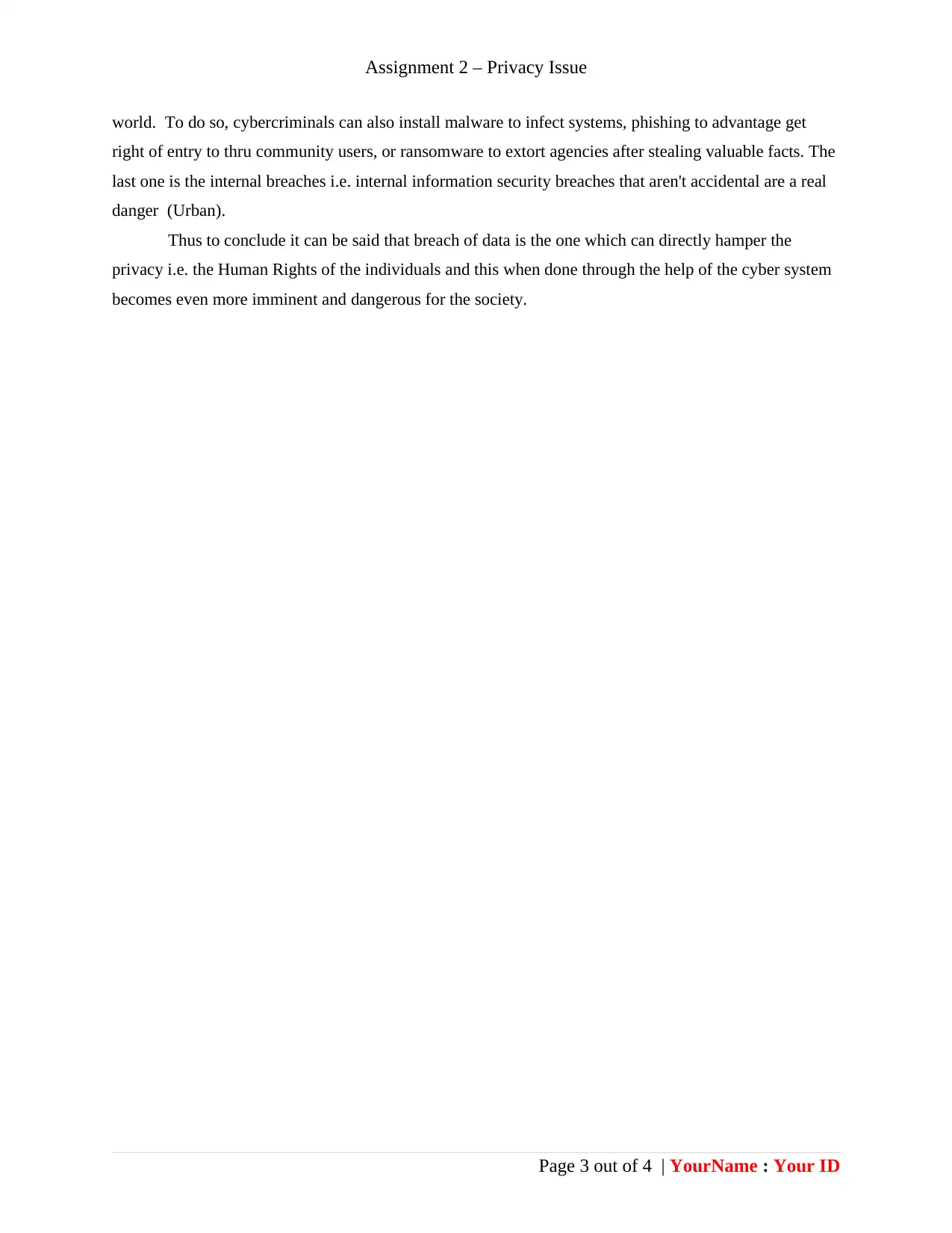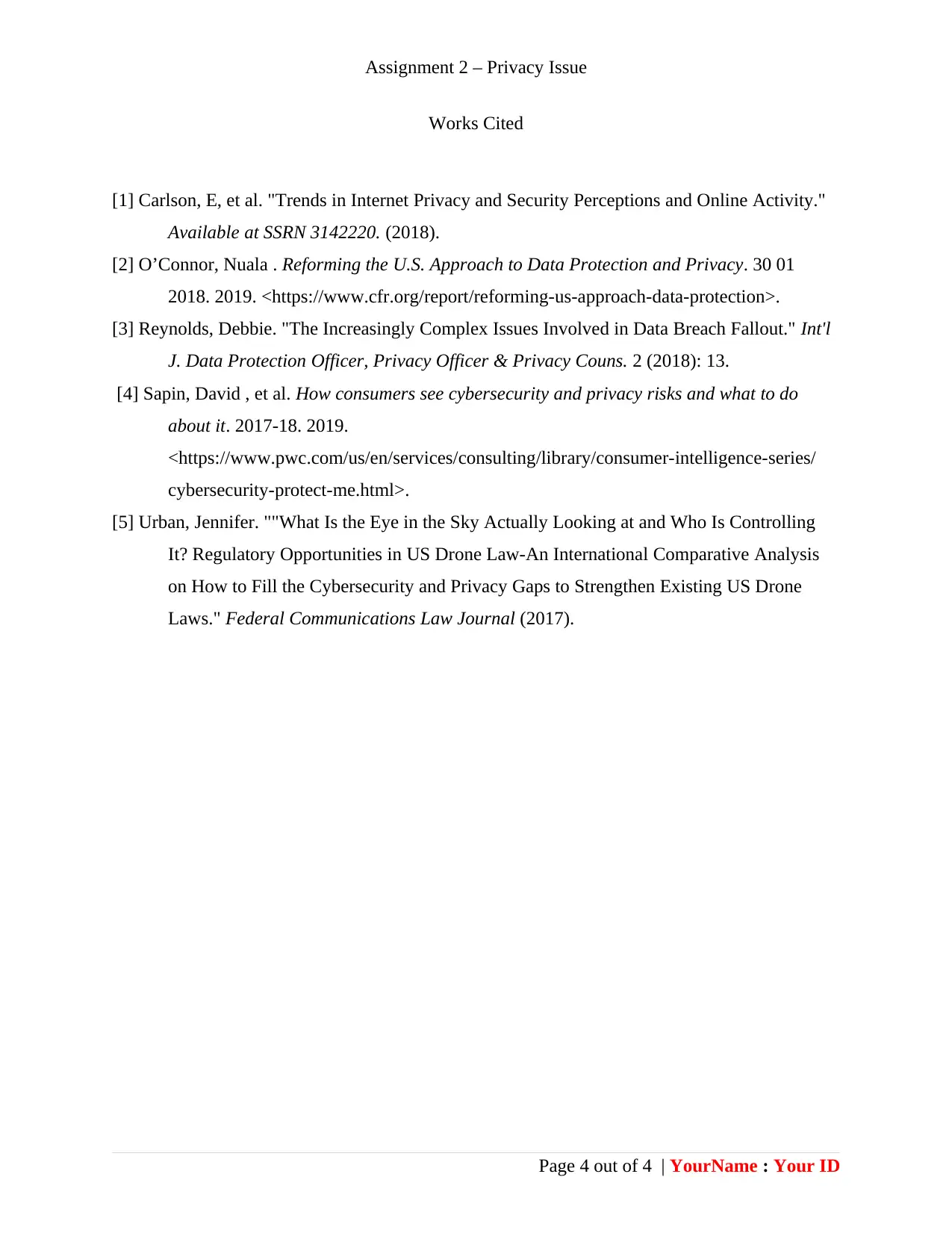Cybersecurity Law: Privacy Issues and Data Breach in China
VerifiedAdded on 2022/10/04
|4
|907
|18
Report
AI Summary
This report examines the critical legal issue of privacy breaches in cybersecurity, particularly focusing on the implications in China and the US. The report highlights the increasing threat of data breaches, emphasizing vulnerabilities in sectors like banking, healthcare, and government. It explores various causes of data breaches, including human error, device loss, cyber-attacks, and internal security failures. The report contrasts privacy protections in China, such as requirements for consent and data confidentiality, with the US context, and analyzes the liabilities of organizations in case of data breaches. The report also references various sources to support its claims and provide a comprehensive overview of the subject matter.

Assignment 2 – Privacy Issue
CYBERSPACE LAW
CHINA
Page 1 out of 4 | YourName : Your ID
CYBERSPACE LAW
CHINA
Page 1 out of 4 | YourName : Your ID
Paraphrase This Document
Need a fresh take? Get an instant paraphrase of this document with our AI Paraphraser

Assignment 2 – Privacy Issue
Breach of data is one of the biggest legal issue which related to privacy and is becoming one of
the major reason behind the occurrence of cybercrimes in the world today. In US breach of data is
deemed like the biggest threat which is mostly seen in the five sectors i.e. banking, business, education,
healthcare and government/militaries. The employees get engaged in the means of hacking, attacks of
which were primarily done through phishing emails, malware, and employee errors or negligence. The
actual nature of data safety breaches will vary depending on the enterprise, business enterprise length, and
network structure. However, on the maximum fundamental level, the statistics breach definition is the
unauthorized and thus gets an entry within or otherwise into the personal digital statistics (Carlson,
Goldberg and McHenry).
It is the owners of data within any organization or the institution, who are held liable for
revealing the personal information of its customers or the clients. For example as per Luke Dembosky
who was a partner of litigation and cybersecurity at Debevoise & Plimpton determined that law firms are
targeted or are considered as vulnerable groups or are targeted (Urban). As it has a lot of regular incoming
emailed as well as other information regarding the clients, which can thus provide a possibility of getting
into the systems of the clients. He further also emphasized upon that it is the law firms that could be
easily targeted and the generated information could be used for ransomware as well as for extortion as
they have weaker defenses and could also pay a larger amount of sum in return (O’Connor).
In China there are various privacy protections available such as Network operators are required to
offer word and obtain consent earlier than collecting personal statistics. Five the non-public records can
best be accrued in a criminal and proper way (Reynolds). Network operators must accumulate and keep
non-public statistics beneath the necessities of the regulation, administrative regulations and agreements
with customers. If the operator violates the provisions of law or rules, and person has the proper to
request that the operator delete the accrued private statistics. Network operators have obligations for
cyber security supervision and shall hold the confidentiality of all private information. Operators shall no
longer reveal, tamper or break private records (Sapin, Cline and Lieberman).
The Cybersecurity Law establishes distinct categories and specific degrees of consequences,
which include financial, administrative and criminal consequences. There are four major types of data
breaches that could be directly or indirectly related to the breaches of data security and first among them
is caused due to the error or fault of the humans. The second one can be caused due to loss of devices i.e.
the loss of gadgets due to non-public forgetfulness or outright robbery can pose a primary safety hazard.
Individuals can be careless and can misplace, smartphones, laptops, capsules, or thumb drives behind or
devices that store proprietary statistics or that provide unfettered get right of entry to in your community
(Reynolds). The third one is the cyber-attack, it is considered as to be the biggest crime all around the
Page 2 out of 4 | YourName : Your ID
Breach of data is one of the biggest legal issue which related to privacy and is becoming one of
the major reason behind the occurrence of cybercrimes in the world today. In US breach of data is
deemed like the biggest threat which is mostly seen in the five sectors i.e. banking, business, education,
healthcare and government/militaries. The employees get engaged in the means of hacking, attacks of
which were primarily done through phishing emails, malware, and employee errors or negligence. The
actual nature of data safety breaches will vary depending on the enterprise, business enterprise length, and
network structure. However, on the maximum fundamental level, the statistics breach definition is the
unauthorized and thus gets an entry within or otherwise into the personal digital statistics (Carlson,
Goldberg and McHenry).
It is the owners of data within any organization or the institution, who are held liable for
revealing the personal information of its customers or the clients. For example as per Luke Dembosky
who was a partner of litigation and cybersecurity at Debevoise & Plimpton determined that law firms are
targeted or are considered as vulnerable groups or are targeted (Urban). As it has a lot of regular incoming
emailed as well as other information regarding the clients, which can thus provide a possibility of getting
into the systems of the clients. He further also emphasized upon that it is the law firms that could be
easily targeted and the generated information could be used for ransomware as well as for extortion as
they have weaker defenses and could also pay a larger amount of sum in return (O’Connor).
In China there are various privacy protections available such as Network operators are required to
offer word and obtain consent earlier than collecting personal statistics. Five the non-public records can
best be accrued in a criminal and proper way (Reynolds). Network operators must accumulate and keep
non-public statistics beneath the necessities of the regulation, administrative regulations and agreements
with customers. If the operator violates the provisions of law or rules, and person has the proper to
request that the operator delete the accrued private statistics. Network operators have obligations for
cyber security supervision and shall hold the confidentiality of all private information. Operators shall no
longer reveal, tamper or break private records (Sapin, Cline and Lieberman).
The Cybersecurity Law establishes distinct categories and specific degrees of consequences,
which include financial, administrative and criminal consequences. There are four major types of data
breaches that could be directly or indirectly related to the breaches of data security and first among them
is caused due to the error or fault of the humans. The second one can be caused due to loss of devices i.e.
the loss of gadgets due to non-public forgetfulness or outright robbery can pose a primary safety hazard.
Individuals can be careless and can misplace, smartphones, laptops, capsules, or thumb drives behind or
devices that store proprietary statistics or that provide unfettered get right of entry to in your community
(Reynolds). The third one is the cyber-attack, it is considered as to be the biggest crime all around the
Page 2 out of 4 | YourName : Your ID

Assignment 2 – Privacy Issue
world. To do so, cybercriminals can also install malware to infect systems, phishing to advantage get
right of entry to thru community users, or ransomware to extort agencies after stealing valuable facts. The
last one is the internal breaches i.e. internal information security breaches that aren't accidental are a real
danger (Urban).
Thus to conclude it can be said that breach of data is the one which can directly hamper the
privacy i.e. the Human Rights of the individuals and this when done through the help of the cyber system
becomes even more imminent and dangerous for the society.
Page 3 out of 4 | YourName : Your ID
world. To do so, cybercriminals can also install malware to infect systems, phishing to advantage get
right of entry to thru community users, or ransomware to extort agencies after stealing valuable facts. The
last one is the internal breaches i.e. internal information security breaches that aren't accidental are a real
danger (Urban).
Thus to conclude it can be said that breach of data is the one which can directly hamper the
privacy i.e. the Human Rights of the individuals and this when done through the help of the cyber system
becomes even more imminent and dangerous for the society.
Page 3 out of 4 | YourName : Your ID
⊘ This is a preview!⊘
Do you want full access?
Subscribe today to unlock all pages.

Trusted by 1+ million students worldwide

Assignment 2 – Privacy Issue
Works Cited
[1] Carlson, E, et al. "Trends in Internet Privacy and Security Perceptions and Online Activity."
Available at SSRN 3142220. (2018).
[2] O’Connor, Nuala . Reforming the U.S. Approach to Data Protection and Privacy. 30 01
2018. 2019. <https://www.cfr.org/report/reforming-us-approach-data-protection>.
[3] Reynolds, Debbie. "The Increasingly Complex Issues Involved in Data Breach Fallout." Int'l
J. Data Protection Officer, Privacy Officer & Privacy Couns. 2 (2018): 13.
[4] Sapin, David , et al. How consumers see cybersecurity and privacy risks and what to do
about it. 2017-18. 2019.
<https://www.pwc.com/us/en/services/consulting/library/consumer-intelligence-series/
cybersecurity-protect-me.html>.
[5] Urban, Jennifer. ""What Is the Eye in the Sky Actually Looking at and Who Is Controlling
It? Regulatory Opportunities in US Drone Law-An International Comparative Analysis
on How to Fill the Cybersecurity and Privacy Gaps to Strengthen Existing US Drone
Laws." Federal Communications Law Journal (2017).
Page 4 out of 4 | YourName : Your ID
Works Cited
[1] Carlson, E, et al. "Trends in Internet Privacy and Security Perceptions and Online Activity."
Available at SSRN 3142220. (2018).
[2] O’Connor, Nuala . Reforming the U.S. Approach to Data Protection and Privacy. 30 01
2018. 2019. <https://www.cfr.org/report/reforming-us-approach-data-protection>.
[3] Reynolds, Debbie. "The Increasingly Complex Issues Involved in Data Breach Fallout." Int'l
J. Data Protection Officer, Privacy Officer & Privacy Couns. 2 (2018): 13.
[4] Sapin, David , et al. How consumers see cybersecurity and privacy risks and what to do
about it. 2017-18. 2019.
<https://www.pwc.com/us/en/services/consulting/library/consumer-intelligence-series/
cybersecurity-protect-me.html>.
[5] Urban, Jennifer. ""What Is the Eye in the Sky Actually Looking at and Who Is Controlling
It? Regulatory Opportunities in US Drone Law-An International Comparative Analysis
on How to Fill the Cybersecurity and Privacy Gaps to Strengthen Existing US Drone
Laws." Federal Communications Law Journal (2017).
Page 4 out of 4 | YourName : Your ID
1 out of 4
Related Documents
Your All-in-One AI-Powered Toolkit for Academic Success.
+13062052269
info@desklib.com
Available 24*7 on WhatsApp / Email
![[object Object]](/_next/static/media/star-bottom.7253800d.svg)
Unlock your academic potential
Copyright © 2020–2025 A2Z Services. All Rights Reserved. Developed and managed by ZUCOL.





